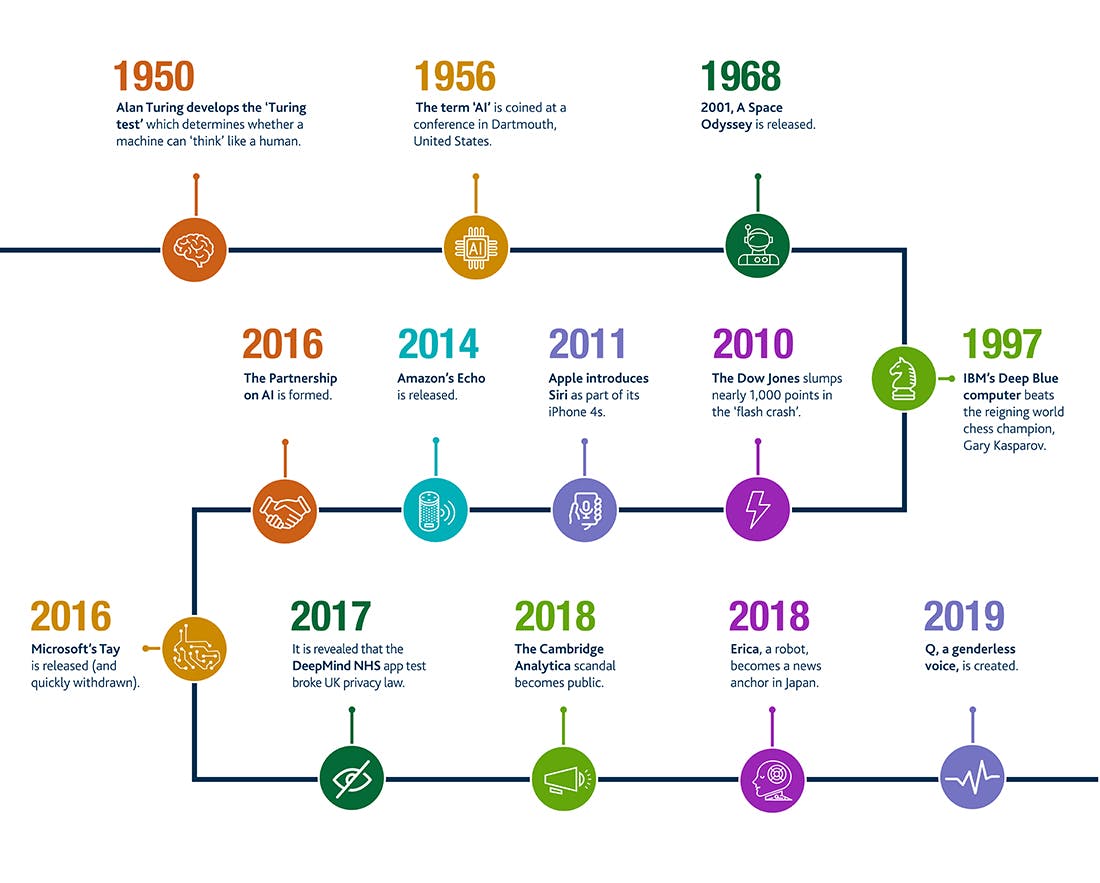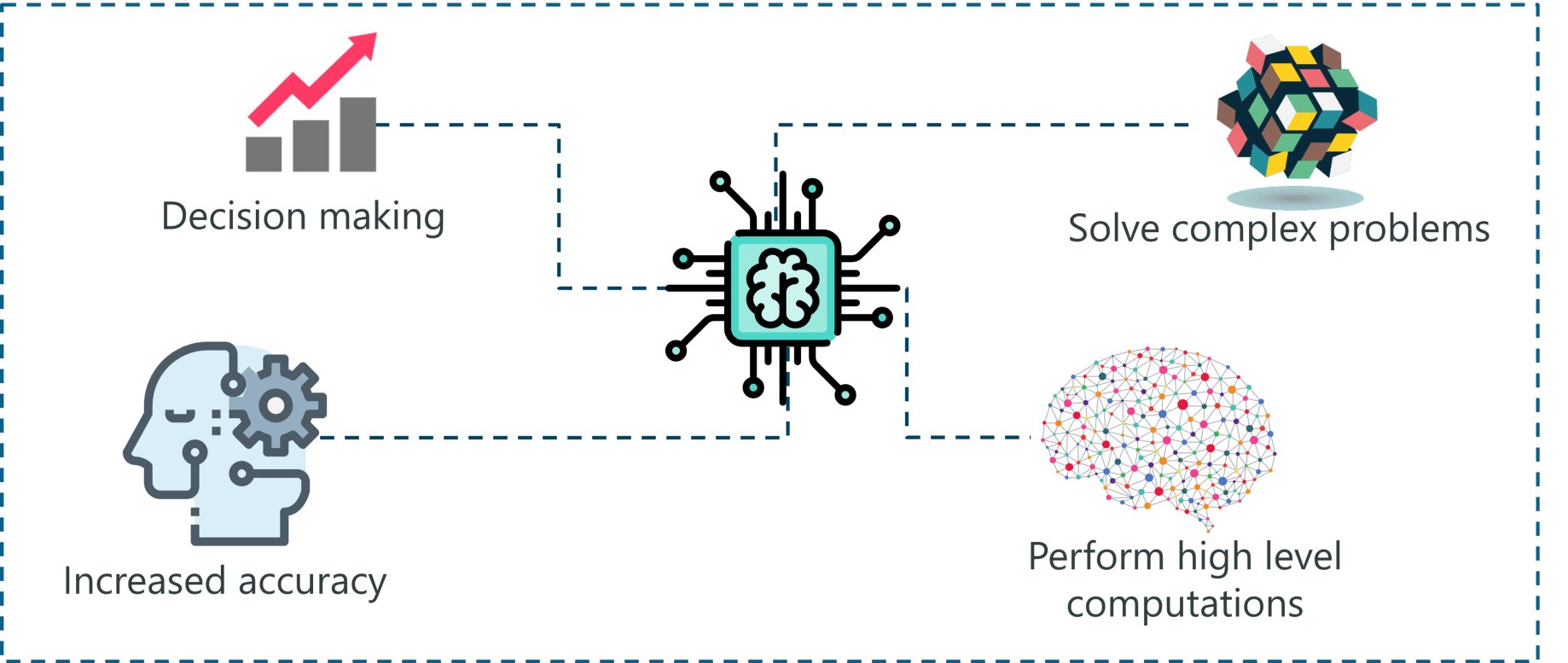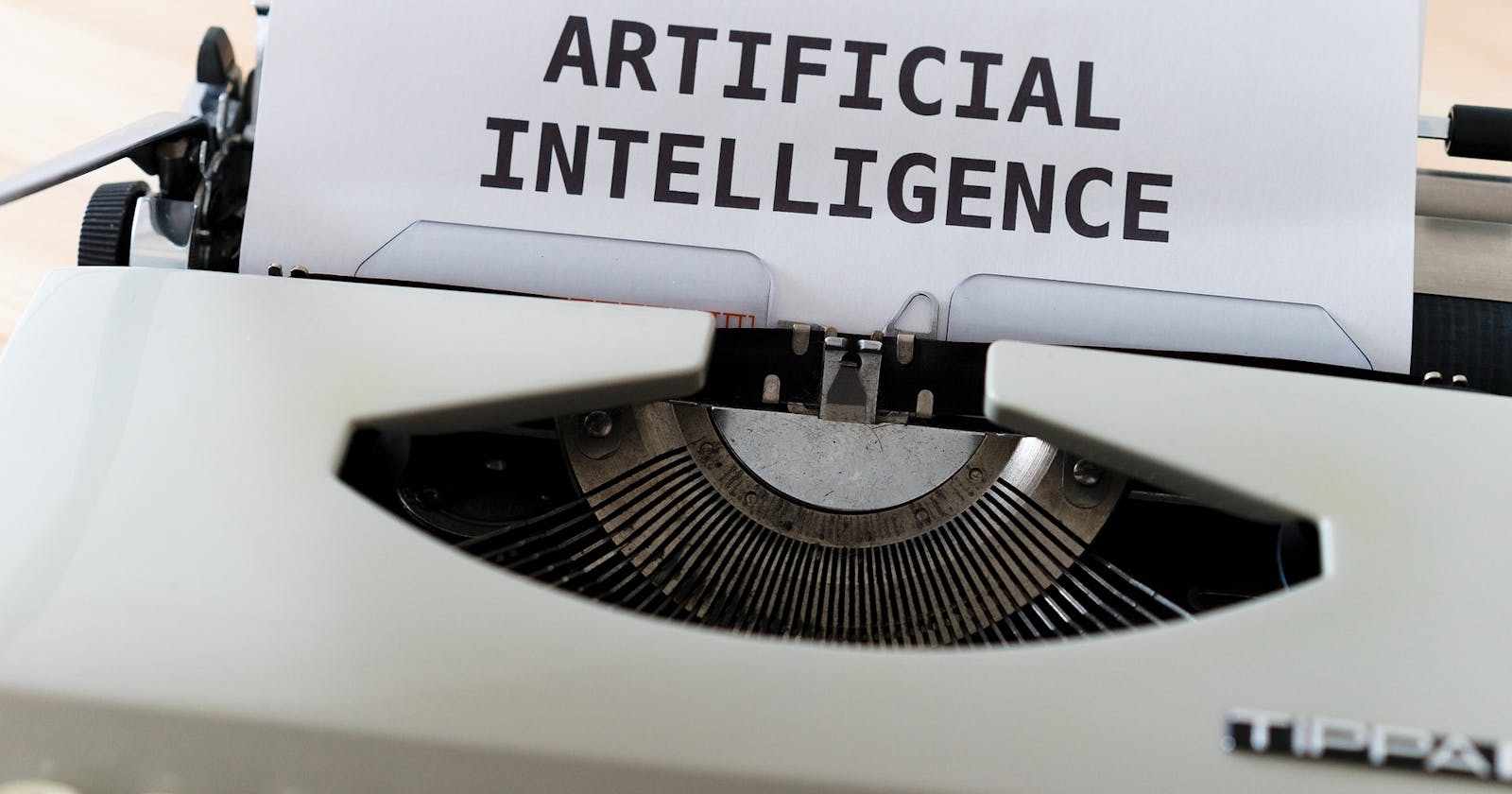Artificial Intelligence is present in our lifestyles every day. If you've ever been on google search engine or even ask Siri about the weather or browse Netflix suggestions then you're probably interacting with AI more than you realized.
Whether we are using our smartphones, surfing the internet, buying products online, using navigation, spending time on social media, or listening to songs on our music streaming, we do interact with AI. It impacts our decisions every day and the way we see the world.
History of Artificial Intelligence
Artificial Intelligence technology is older than we would imagine. The image below highlights AI advancement.

The term "Artificial Intelligence" was first coined back in 1956 by Dartmouth's professor John McCarthy. He was widely recognized as the father of AI due to his stunning contribution to the field of Computer Science and AI. John McCarthy offers the following definition in this 2004 paper:
It is the science and engineering of making intelligent machines, especially intelligent computer programs. It is related to the similar task of using computers to understand human intelligence, but AI does not have to confine itself to biologically observable methods.
From this definition we have the word "Intelligence", what does it mean to be artificially intelligent?
What is intelligence?
According to Jack Copeland who has written several books on Artificial Intelligence and who is the director of the Turing Archive (Turing is a prominent leader in Artificial Intelligence), some of the most important factors of intelligence are:
Generalized Learning: Learning that involves generalisation leaves the learner able to perform better in situations not previously encountered.
Reasoning: Reasoning involves drawing inferences that are relevant to the task or situation at hand.
Problem solving: Given such-and-such data, find x.
Perception: Analyzing a scanned environment and analyzing the features and relationships between objects.
Language-understanding: Understanding language by following syntax and other rules similar to humans.
But, what is exactly Artificial Intelligence?
Artificial Intelligence can be defined as the development of computer systems that are capable of performing tasks that normally require human intelligence such as decision making, object detection, solving complex problems and so on.
 A simple definition of Artificial intelligence is the ability of machines to perform certain tasks which needs intelligence.
The backbone of AI is Machine Learning. And the term is pretty self-explanatory:
A simple definition of Artificial intelligence is the ability of machines to perform certain tasks which needs intelligence.
The backbone of AI is Machine Learning. And the term is pretty self-explanatory:
We want to make machines learn based on its knowledge and make decision
How do machines learn?
While it may be easy for a human to make a difference between a cat and a dog, for a computer not so much. However, if we considered only physical appearance, i.e. elements such as the colour of the skin, the texture of the hair, the size of the ears or the shape of the tail, the difference will not be evident because there are several varieties of cats and dogs and there are no universal rules to describe a cat or a dog.
The best way that it could learn would be as a child: by experience. The AI machine would have to learn through input and experiences, constantly progressing and advancing its abilities over time.
With Machine Learning, programs will analyze thousand of examples of cats and dogs to build an algorithm. It then readjusted the algorithm based on if he achieve the goals. And over time, it becomes more intelligent and manages to find patterns that characterize each species.
Stages of Artificial Intelligence
AI is divided into 3 stages :
- Artificial Narrow Intelligence (ANI)
- Artificial General Intelligence (AGI)
- Artificial Super Intelligence (ASI)
Artificial Narrow Intelligence (ANI): Also known as Weak AI, ANI is the stage of Artificial Intelligence involving machines that can perform a narrowly set of specific tasks. They are designed to solve one single problem and would be able to execute a single task well. At this stage, the machine doesn't possess any thinking ability. This is the only kind of AI that exists today. They can come close to human functioning in very specific contexts and even surpass them. For example, we have AlphaGo a program that had beaten European champion Fan Hui, becoming the first program to defeat a professional player. Other examples of ANI are Siri, Face ID, Alexa.
Artificial General Intelligence (AGI): Also known as Strong AI, AGI is the stage of Artificial Intelligence wherein machines will possess the ability to think and make decisions just like humans. AGI is still a theoretical concept. They are currently no existing example of strong AI. Strong AI is considered a threat to human existence by many scientists such as Stephen Hawking who quoted that:
"The development of full artificial intelligence could spell the end of the human race"
Artificial Super Intelligence (ASI): Artificial Super Intelligence is the stage of Artificial Intelligence when the capability of computers will surpass human beings and can perform any task better than humans with cognitive properties. Super AI is still a speculative concept of Artificial Intelligence. The development of such systems in real is still a world-changing task. They are usually seen in SciFi-movies and books.
"AI is a fundamental risk to the existence of human civilization" Elon Musk.
Types of Artificial Intelligence
Based on the functionally of AI-based systems, Artificial Intelligence can be divided into 4 types:
- Reactive Machines AI
- Limited Memory AI
- Theory of Mind AI
- Self-Awareness AI
Reactive Machines AI are machines that operate purely based on the present data, considering only the present situation. These machines do not store memories and do not rely on past actions to take future actions. An example of a reactive machine is IBM Deep Blue which defeated world champion Garry Kasparov(1997) in chess.
Limited Memory AI can inform and improve decisions by studying the past data from its memory. These machines can store past experiences or some data for a short period. Self-driving cars are one of the best examples of Limited Memory systems. These cars can store the recent speed of nearby cars, the distance of other cars, speed limit, and other information to navigate the road.
Theory of Mind AI will mainly focus on emotional intelligence. These machines should understand human emotions, people, beliefs, and be able to interact socially like humans. Theory of Mind AI are still not developed, but researchers are making lots of efforts and improvement for developing such AI machines.
Self-Awareness AI is the future of Artificial Intelligence. These machines will be super intelligent, have their consciousness, sentiments, and self-awareness. Self-Awareness AI does not exist in reality still and it is a hypothetical concept. This type of AI doesn't exist yet.
Domain of Artificial Intelligence
Artificial Intelligence can be used to solve real-world problems by using :
- Machine Learning
- Deep Learning
- Natural Language Processing
- Computer Vision
- Robotics
- Experts systems
- Fuzzy Logic
Machine Learning: It's the ability for machines to learn based on their knowledge and make decisions. These algorithms are designed in a way that they learn and improve over time when are exposed to new data.
Deep Learning: It's a subset of Machine Learning that imitates the working of the human brain in data processing and designing models for decision-making purposes.
Natural Language Processing : Natural language processing is a branch of artificial intelligence that helps computers understand, interpret and manipulate human language.
Computer Vision : The goal of Computer vision is to imitate human vision.
Robotics : It's a branch of engineering that involves the conception, design, manufacture, and operation of robots.
Experts systems : It's a program that uses artificial intelligence technology to simulate the knowledge and judgement of humans.
Fuzzy Logic : Fuzzy Logic is a method of reasoning that resembles human reasoning. The approach of FL imitates the way of decision making in humans that involves all intermediate possibilities between digital values YES and NO.
Conclusion
AI remains the revolution of the 21st century. Even though it can be a risk for the existence of the human race if it's not controlled, we can say without mistake that it is an integral part of our daily lives and contributes to making it better through its various applications in the main fields of society.
